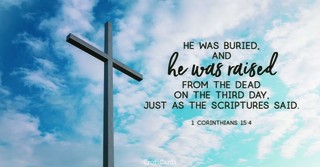
- Recent Translations
- All Translations
1 Corintios 15:36 Meaning and Commentary
Thou fool
Not transgressing the law of Christ, which makes him that calls his brother a fool in danger of hell fire; for the apostle said not this in anger, and from a malevolent disposition, as that rule supposes, but out of zeal for truth, and to reprove the stupidity and folly of such a bold objector; in opposing the veracity and power of God, in setting up his reason above divine revelation, and in not attending even to natural philosophy itself; in which professing to be wise he might be justly called a fool, and therefore sends him to the husbandman to learn of him how to answer his own queries:
that which thou sowest is not quickened except it die;
and which is more especially true of a grain of wheat: our Lord observes the same, (See Gill on John 12:24), and designs by the simile his own death, and resurrection, and the fruit following thereon. This seed being cast into the earth corrupts, rots, and dies, and then is quickened, and rises up in stalk, blade, and ear. Which shows that the dissolution and corruption of the body by death is so far from being an objection to its resurrection, that it is necessary to it, even as the dying and putrifying of the seed, or grain of wheat, is necessary to its quickening and rising up again; and that if God is able to quicken a seed or grain that is rotten and entirely dead, and cause it to rise up in verdure and with much fruit, as he does every year in millions of instances, why should it be thought incredible that God should quicken dead bodies, when the one is as much an instance of his power as the other? The Claromontane exemplar reads, "except it die first"; and so the Vulgate Latin version.
